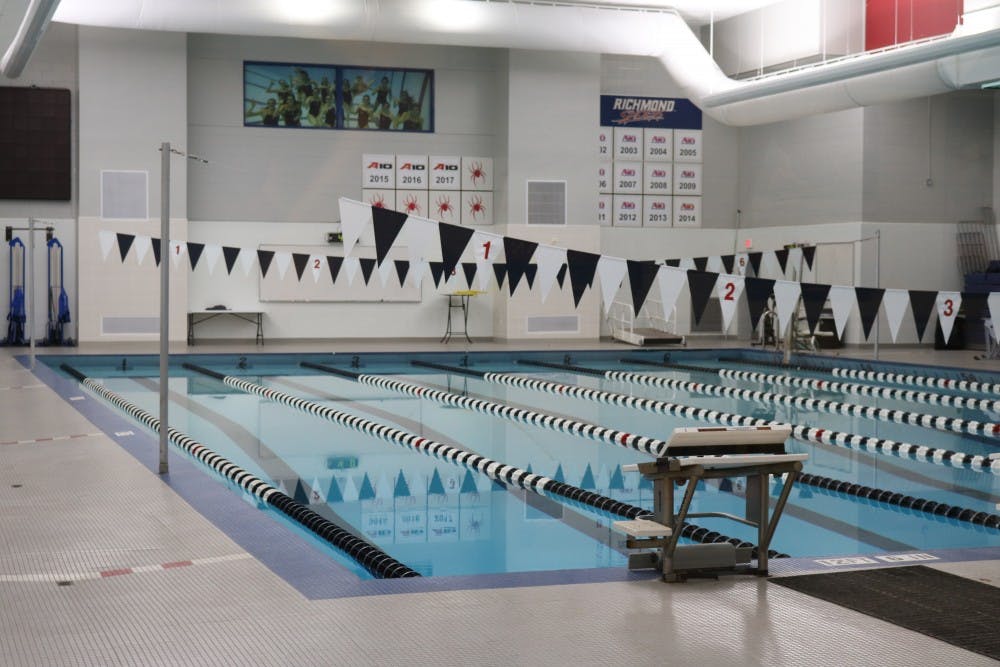The University of Richmond women's swimming and diving team had a winter break away from annual team training for the first time ever.
In November, the Atlantic 10 Swimming and Diving Championship, originally scheduled for early February, was postponed to mid-April because of the COVID-19 pandemic. This meant the team could return home for the holiday season.
Head coach Matt Barany said worked with coaches across the country to hold virtual swim meets during the fall semester. Using live-stream cameras and touchpads to record, the swim and dive team members raced simultaneously in the same pool against each other, then watched their opponents swim the same events live. The team competed in this way against, for example, Northeastern. Barany wrote the team also did online results comparisons with Tulane and Duquesne on another occasion.
However, according to the NCAA, the virtual swim meets cannot count towards bona fide competitions, because virtual meets do not satisfy meet the requirements set out by the NCAA. Despite this, Barany said the virtual meets had been a way to bring energy to the fall season of virtual meets.
The postponement of the A-10 Championship forced Barany to pivot the team's training schedule.
“That was a big hurdle for us, in that we suddenly had to change our training period and how that was going to play out,” Barany said.
Not only was the team going home for a long break, during which many members would not have access to pools, its training cycle had also decreased from 26 weeks to 14 weeks, Barany said. But Barany said he actually preferred this change in the training cycle. He explained, "I think two rounds of 14 is preferable during the pandemic because it offered us a chance to rejuvenate at home with home cooking and our beds." Barany also conveyed how his athletes can feel burned out over time as they've been training nonstop since the summer. "We hoped to avoid this," Barany wrote.
Barany said he expected his athletes' motivation to triple because they would be able to race in person for the conference championship. He also said traveling to race would be more enjoyable in the spring because of warmer weather in colder places like Ohio.
Senior diver Alex Beran commented on the new mentality of the team now that there is a promising date for the A-10 Championship.
“People know they’re working for something, and I think it was good for people to recharge over the winter break,” she said.
Barany is most concerned about his athletes' health.
“Right now I’m not looking at athletic performance, but [rather] balanced emotional health and ability to fight off any type of infection or disease,” he said.
Enjoy what you're reading?
Signup for our newsletter
Barany said he had stressed the importance of sleep regularity to the team early on in the fall because of its known benefits, such as improved mental health and stronger immunity. Barany moved the team’s practice start time from 5:30 a.m. to 6 a.m. to encourage getting more sleep.
“Our sleep went up in the fall, and our team GPA was a 3.66," Barany said. "And that’s the highest it’s ever been for us."
When the athletes were sent home for winter break, Barany knew that not all of his athletes had the luxury of training at a swimming facility.
Unlike some of her teammates, sophomore Olivia Hutton had access to a pool over the winter break. Hutton said she trained at her home club, Quest Swimming in Midlothian, Virginia. Hutton was able to stay in shape by completing the workouts that Barany uploaded onto an app called Commit.
Barany said he has used the app for the swim and dive team for five years now. Using Commit, he is able to upload swim and land training workouts for his athletes to voluntarily complete during breaks.
Some athletes, such as Beran, did not have access to a pool because of the COVID-19 restrictions in their respective hometowns.
“[The divers] use a slant board to help keep up with our balance,” she said. A slant board is a contraption that allows divers to stand at a 45-degree angle, emulating the position of the bend in a diving board. Beran wrote, "It works the muscles we use while pressing on the board."
Beran also participated in a lot of Barre workout classes while she was at home for break, she said. Beran said Barre was a great way for her to stay in shape.
Reflecting back on the current circumstances of the swim and dive's practice and competition schedule, Barany does not have any doubts about maintaining his team's competitiveness. Barany said, "Even if dual meets don't happen, I still thin hoping to race A-10's will keep our blood boiling."
Barany said some team members hoped to make trial cuts for the 2021 Olympics, given that the 2020 Olympics were postponed due to the pandemic.
Barany mentioned that there are post-season meets that his athletes can qualify for if they meet the time standards for the particular meet. “There’s still some motivating qualifying standards out there," he said. "And if we can't travel and we have to do virtual meets in the spring, we already have some experience there, so I'm not worried."
Contact sports editor Grace Mittl at grace.mittl@richmond.edu.
Support independent student media
You can make a tax-deductible donation by clicking the button below, which takes you to our secure PayPal account. The page is set up to receive contributions in whatever amount you designate. We look forward to using the money we raise to further our mission of providing honest and accurate information to students, faculty, staff, alumni and others in the general public.
Donate Now



